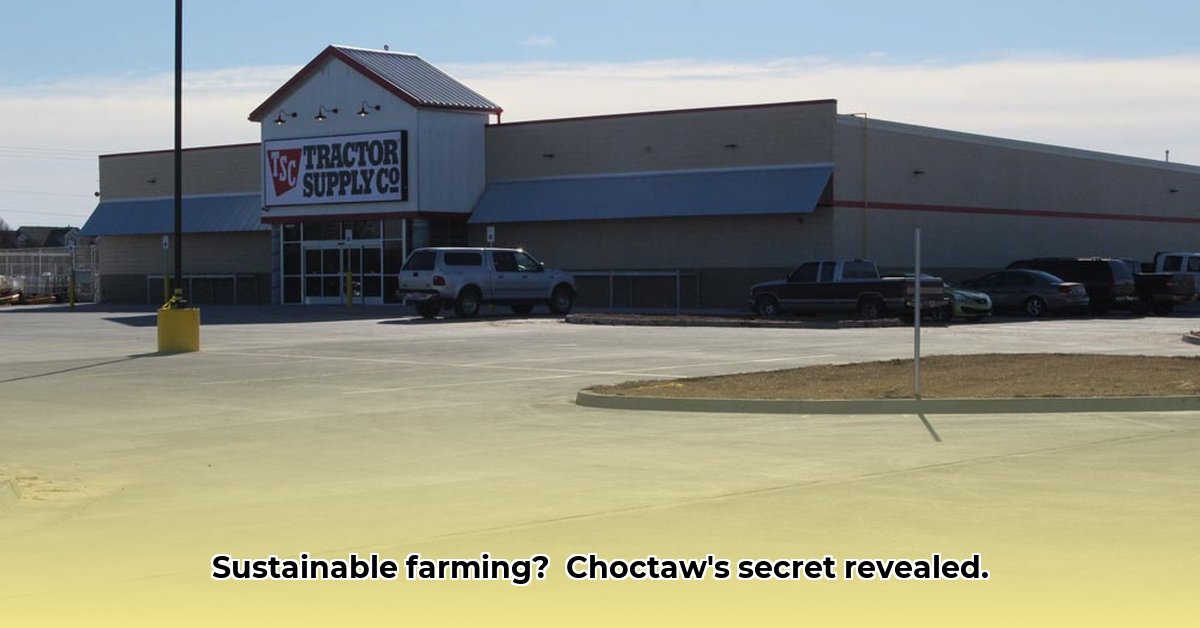
Tractor Supply Choctaw, Oklahoma: Your Local Partner in Sustainable Farming
Imagine Sarah, a Choctaw farmer whose family has worked the land for generations. She needs drought-resistant seeds and efficient irrigation equipment for her small farm. The nearest agricultural supply store, Tractor Supply (TSC), is vital. This article explores TSC Choctaw's role in supporting sustainable agriculture, examining its positive contributions and areas for improvement. The question remains: does TSC effectively empower local growers and foster a healthier food system? For similar stores in nearby areas, check out this example.
More Than Just a Store: Supporting Local Agriculture
TSC Choctaw offers a range of products crucial for sustainable farming: high-quality seeds, organic fertilizers, durable tools, and livestock supplies. This accessibility is transformative for small-scale farmers, leveling the playing field and fostering local food security. Sarah notes, "Getting everything I need locally saves time and money—a huge help for our small farm." This convenience strengthens the local food system and supplies the community with fresh, locally-grown produce. But how does this translate to larger sustainability goals?
Transparency: The Missing Piece of the Puzzle
Despite TSC's support for local farmers, a significant gap exists: a lack of public data regarding their supply chain sustainability. Information on product origins, waste management, and transportation impacts is limited, hindering a complete environmental impact assessment. This lack of transparency makes it difficult for consumers to make fully informed choices. A recent report on corporate sustainability efforts highlights a similar issue across the industry.
The Positive Local Impact: A Closer Look
TSC's local presence reduces transportation needs for farmers, minimizing fuel consumption and carbon emissions. This is particularly beneficial for small-scale operations with limited budgets. The store also contributes to the local economy by employing local residents and indirectly supporting related businesses. The increased accessibility to farming supplies contributes directly to enhanced food security within the Choctaw community. But is this enough? Do the localized benefits outweigh the lack of broader transparency?
Opportunities for Growth: A Call for Action
To strengthen its sustainability commitment, TSC Choctaw can improve in several key areas:
Supply Chain Transparency: Publicly disclose product origins, highlighting sustainably sourced materials to build consumer trust.
Waste Reduction: Implement and promote waste reduction strategies throughout the store and supply chain to minimize environmental impact.
Transportation Efficiency: Explore and implement more eco-friendly transportation methods (e.g., electric vehicles) to lower carbon emissions.
Sustainable Product Selection: Expand organic and sustainably produced goods to meet growing consumer demand.
Embracing these improvements would significantly enhance TSC's sustainability profile and its role as a community partner.
The Future of Sustainable Farming: A Collective Effort
Supporting local businesses promoting sustainable practices is crucial. As consumers, we can drive change by choosing stores like TSC Choctaw and actively inquiring about their sustainability initiatives. This encourages transparency and accountability throughout the supply chain. It’s a collaborative effort—we all share responsibility for cultivating an environmentally responsible future.
How Does Tractor Supply Contribute to Sustainable Farming Practices?
Key Takeaways:
- TSC's local impact on sustainable farming in Choctaw requires further investigation.
- Enhancing supply chain transparency is paramount for TSC to fully demonstrate its sustainability commitment.
- Balancing localized benefits with broader sustainability goals is crucial for TSC's continued growth.
TSC's Commitment to Sustainability: A Balancing Act
TSC has shown progress in certain sustainability goals, including carbon emission reductions. However, transparency surrounding supply chain sustainability, water conservation, and broader environmental impact remains a key challenge. The company's commitment to net-zero emissions by 2040 shows ambition; however, detailed implementation plans are still needed to build trust and accountability.
Examining TSC's Local Impact in Choctaw, Oklahoma: A nuanced perspective
TSC Choctaw provides essential tools and supplies to local farmers, bolstering food security and reducing transportation emissions. However, a more in-depth analysis of the store's direct contribution to ecologically sound farming practices is required. Further research could examine sourcing practices for products sold at the Choctaw store and the potential for promoting more sustainable alternatives.
The Sustainability Gap: A Call for Data
The lack of readily available data on TSC's supply chain and environmental impacts hinders a complete assessment of their sustainability profile. This transparency gap needs to be addressed to support consumer confidence and investor expectations. In-depth reporting on water usage, waste management, and Scope 3 emissions (those from their supply chain) is urgently needed. This lack of publicly accessible data presents a significant challenge.
Areas for Improvement: Actionable Steps
TSC should enhance transparency across its operations, providing more specific details of its water conservation strategies and Scope 3 emissions reduction targets. This also provides an opportunity to forge deeper partnerships with local farmers to showcase and promote sustainable agricultural practices. Publicly available metrics and progress reports would bolster credibility and attract environmentally conscious customers.
The Local Farmer's Voice: An Unheard Story
Integrating the perspectives of local farmers who rely on TSC's products would enrich the narrative, showcasing both the store's positive impacts and areas where improvements are needed. More qualitative research is necessary to capture the complete picture. Their stories would provide invaluable insight into the real-world effects of TSC's role in sustainable farming.